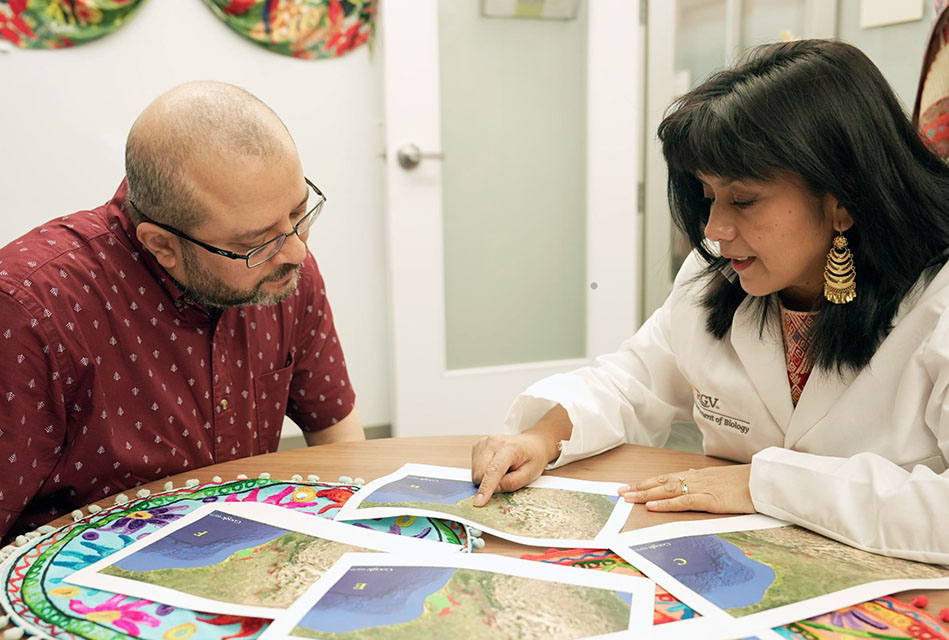
Dr. Teresa Patricia Feria-Arroyo, PhD. and Dr. Tamer Oraby, PhD., are establishing risk maps of vector-borne diseases for South Texas and Northern Mexico. (UTRGV Photo by Jesús Alférez)
News Release | Research

Dr. Teresa Patricia Feria-Arroyo, PhD. and Dr. Tamer Oraby, PhD., are establishing risk maps of vector-borne diseases for South Texas and Northern Mexico. (UTRGV Photo by Jesús Alférez)
Monday, April 24, 2023
Research, Faculty Focus
By News and Internal Communications
By María González
RIO GRANDE VALLEY, TEXAS – APRIL 24, 2023 – A research project led by two UTRGV professors will develop coastal flood models that map how climate-related events increasingly affect the spread and emergence of infectious diseases.
Dr. Teresa Patricia Feria-Arroyo, a UTRGV professor of Biology and principal investigator on the project, and co-PI Dr. Tamer Oraby, associate professor of Statistics in the School of Mathematics and Statistical Science, have been awarded a $197,000 sub-award from a global charitable foundation for their research.
The project – “FloDisMod, A Framework for Flood and Disease Modeling” – is one of 24 projects awarded across 12 countries by the Wellcome Trust (UK) Digital Technology Development Award in Climate Sensitive Infectious Disease Modelling.
The goal of the project at UTRGV is to potentially improve the lives of people living in South Texas and Northern Mexico.
“Our research project aims to establish risk maps of vector-borne diseases – that is, diseases carried and transmitted by insects,” Feria said. “Those diseases include chagas, dengue and chikungunya, to name a few, for South Texas and Northern Mexico.
“The project will incorporate flooding, climate change and the current presence of vectors (kissing bugs, mosquitoes, ticks) to develop fine-scale maps of potential vector-borne disease outbreaks in the study area," she said.
INTERDISCIPLINARY SYNERGY
Researchers at UT Austin are leading the project to develop a new flood and disease modelling framework. The project involves UTRGV as a sub-awardee contributing to the project's objective of positioning UTRGV as a global leader in flood and vector-borne disease modelling.
“In addition, the grant serves to champion leading research at UTRGV, healthcare, sustainable development, community engagement, and well-being for the Valley community," Oraby said.
The grant is a collaboration with project lead applicant Dr. Clint Dawson, chair of the UT Austin Department of Aerospace Engineering and Engineering Mechanics; Dr. Suzanne Pierce, research scientist at UT Austin and director of Planet Texas 2050; Dr. Katherine Brown, senior research scientist at UT Austin and the University of Cambridge in the United Kingdom; and Dr. Chrysoula Panethymitaki, research program manager at UT Austin.
Oraby said the synergy between biology, statistics and data sciences is instrumental in this research, with outcomes that would help design sound plans to protect humans from contracting infectious diseases transmitted by insects.
The collaborative teams at UTRGV and UT Austin also aim to collaborate with both the UTRGV School of Medicine and the College of Health Education to train future healthcare practitioners on the importance of observing environmental and climatic factors related to outbreaks of vector-borne diseases.
STUDENT AND COMMUNITY ENGAGEMENT
The project aims to fulfill UTRGV’s missions of championing leading research, student success and community engagement.
"UTRGV's researchers are enriching our lives, impacting the Rio Grande Valley and beyond," Dr. Can (John) Saygin, senior vice president for Research and dean of the UTRGV Graduate College. “The confidence the Wellcome Trust foundation has in the project, and to invest at this level, highlights the work being done at our university and the underscores the quality of our faculty and students to conduct this type of research.”
The grant will support the training of graduate students in South Texas through collaborations with stakeholders and the local community in projects related to infectious diseases.
"Graduate students participating in this project will be at the forefront of the next generation of scientists in the field of vector-borne diseases and flood modeling who could work on local issues with global significance," Feria said.
Educational materials in English and Spanish will be developed and distributed to community members and future health practitioners, to provide them with information about the prevention and control of vector-borne diseases in the area.
FloDisMod also will engage the community in the project's goals and activities, such as developing accessible risk maps and information for all.
“We look forward to working with members of our communities and learning from each other to prevent and control infectious diseases transmitted by insects in this transboundary Texas-Mexico region," Feria said.
Feria and Oraby are recruiting graduate students in the fields of ecological sciences and statistics and data science, to start the research project in Fall 2023.
For more information, contact Feria at teresa.feriaarroyo@utrgv.edu and Oraby at tamer.oraby@utrgv.edu.
ABOUT UTRGV
The University of Texas Rio Grande Valley (UTRGV) was created by the Texas Legislature in 2013 as the first major public university of the 21st century in Texas. This transformative initiative provided the opportunity to expand educational opportunities in the Rio Grande Valley, including a new School of Medicine and a School of Podiatry, and made it possible for residents of the region to benefit from the Permanent University Fund – a public endowment contributing support to the University of Texas System and other institutions.
UTRGV has campuses and off-campus research and teaching sites throughout the Rio Grande Valley including Brownsville (formerly The University of Texas at Brownsville campus), Edinburg (formerly The University of Texas-Pan American campus), Harlingen, Weslaco, McAllen, Port Isabel, Rio Grande City and South Padre Island. UTRGV, a comprehensive academic institution, enrolled its first class in the fall of 2015; the School of Medicine welcomed its first class in the summer of 2016, and the School of Podiatric Medicine in the fall of 2022.